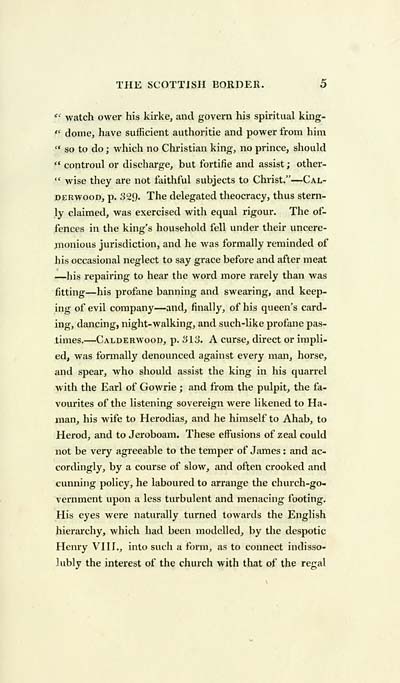Download files
Complete book:
Individual page:
Thumbnail gallery: Grid view | List view

THE SCOTTISH BORDER. 5
'' watch ower his ku'ke, and govern his spiritual king-
" dome, have sufficient authoritie and power from him
" so to do ; which no Christian king, no prince, should
" controul or discharge, but fortifie and assist; other-
" wise they are not faithful subjects to Christ." — Cal-
DERWOOD, p. 329. The delegated theocracy, thus stern-
ly claimed, was exercised with equal rigour. The of-
fences in the king's household fell under their uncere-
monious jurisdiction, and he was formally reminded of
his occasional neglect to say grace before and after meat
— his repairing to hear the word more rarely than was
fitting — his profane banning and swearing, and keep-
ing of evil company — and, finally, of his queen's card-
ing, dancing, night- walking, and such-like profane pas-
times. — Calderwood, p. 313. A curse, direct or impli-
ed, was formally denounced against every man, horse,
and spear, who should assist the king in his quarrel
with the Earl of Gowrie ; and from the pulpit, the fa-
vourites of the listening sovereign were likened to Ha-
man, his wife to Herodias, and he himself to Ahab, to
Herod, and to Jeroboam. These effusions of zeal could
not be very agreeable to the temper of James : and ac-
corcUngly, by a course of slow, and often crooked and
cunning policy, he laboured to arrange the church-go-
vernment upon a less turbulent and menacing footing.
His eyes were naturally turned towards the English
hierarchy, which had been modelled, by the despotic
Henry VHI., into such a form, as to connect indisso-
lubly the interest of the church with that of the regal
'' watch ower his ku'ke, and govern his spiritual king-
" dome, have sufficient authoritie and power from him
" so to do ; which no Christian king, no prince, should
" controul or discharge, but fortifie and assist; other-
" wise they are not faithful subjects to Christ." — Cal-
DERWOOD, p. 329. The delegated theocracy, thus stern-
ly claimed, was exercised with equal rigour. The of-
fences in the king's household fell under their uncere-
monious jurisdiction, and he was formally reminded of
his occasional neglect to say grace before and after meat
— his repairing to hear the word more rarely than was
fitting — his profane banning and swearing, and keep-
ing of evil company — and, finally, of his queen's card-
ing, dancing, night- walking, and such-like profane pas-
times. — Calderwood, p. 313. A curse, direct or impli-
ed, was formally denounced against every man, horse,
and spear, who should assist the king in his quarrel
with the Earl of Gowrie ; and from the pulpit, the fa-
vourites of the listening sovereign were likened to Ha-
man, his wife to Herodias, and he himself to Ahab, to
Herod, and to Jeroboam. These effusions of zeal could
not be very agreeable to the temper of James : and ac-
corcUngly, by a course of slow, and often crooked and
cunning policy, he laboured to arrange the church-go-
vernment upon a less turbulent and menacing footing.
His eyes were naturally turned towards the English
hierarchy, which had been modelled, by the despotic
Henry VHI., into such a form, as to connect indisso-
lubly the interest of the church with that of the regal
Set display mode to: Large image | Transcription
Images and transcriptions on this page, including medium image downloads, may be used under the Creative Commons Attribution 4.0 International Licence unless otherwise stated. ![]()
| Early Gaelic Book Collections > J. F. Campbell Collection > Minstrelsy of the Scottish border > Volume 2 > (17) |
|---|
| Permanent URL | https://digital.nls.uk/80614895 |
|---|
| Description | Vol. II . |
|---|---|
| Shelfmark | Cam.2.d.18 |
| Attribution and copyright: |
|
| Description | Volumes from a collection of 610 books rich in Highland folklore, Ossianic literature and other Celtic subjects. Many of the books annotated by John Francis Campbell of Islay, who assembled the collection. |
|---|
| Description | Selected items from five 'Special and Named Printed Collections'. Includes books in Gaelic and other Celtic languages, works about the Gaels, their languages, literature, culture and history. |
|---|

